Terrors of the Past Are Gone, but Chains Still Bind Gay Romanians
A 2018 homophobic referendum stirs up stirs up memories of persecution under far-right and Communist regimes.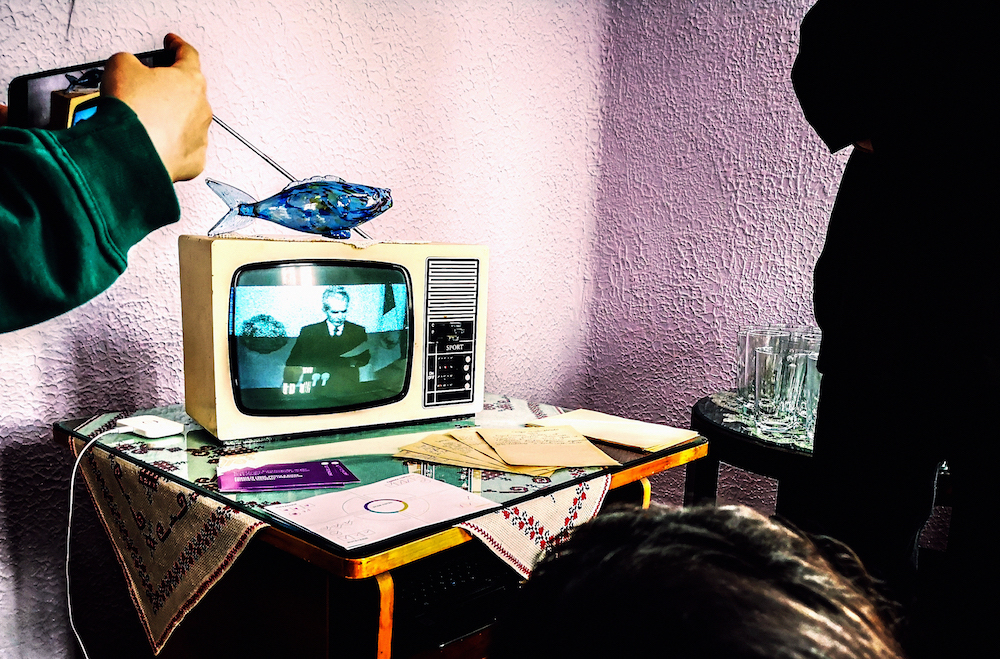 An event space in Bucharest, Romania, designed to re-create the feel of a 1980s apartment during the Communist regime. The television set features the image of Nicolae Ceauşescu, the Communist leader who led a campaign of terror against the Romanian gay community. (Alexandra Crisbășan)
An event space in Bucharest, Romania, designed to re-create the feel of a 1980s apartment during the Communist regime. The television set features the image of Nicolae Ceauşescu, the Communist leader who led a campaign of terror against the Romanian gay community. (Alexandra Crisbășan)
Truthdig is proud to present this article as part of its Global Voices: Truthdig Women Reporting, a series from a network of female correspondents around the world who are dedicated to pursuing truth within their countries and elsewhere. Click here to read Alexandra Crisbășan’s coverage of a transgender life in Romania, produced in conjunction with this story.
BUCHAREST, ROMANIA — In Romania, the winters are cold and snowy, and the sun sets early. Though it was barely past 6 that February night in 2018, the streetlights were on. The snow squeaked under my feet, and steam was coming out of my mouth as I headed for the Romanian Peasant Museum in the center of Bucharest. I was going to watch “Soldiers: A Story from Ferentari,” a Romanian movie about a love story between two men from different backgrounds. While I waited at the traffic light to cross the crowded boulevard, I saw a crowd gathered around the museum. Some of the group wore national folk costumes, and many were shouting and screaming. Reporters and camera crews surrounded them. I knew why they had gathered there.
Those in the crowd, dressed in traditional Romanian clothing and wearing crosses and placards, were members of far-right organizations. They had come because they knew that a “gay movie” would be shown at the museum. They considered this to be an insult, because, in their words, “the Romanian peasant is not gay.” Their purpose was to stop the event, but, as they were surrounded by cameras, they did not make any move toward me or other people who had come to see the movie. Instead, some of the group bought tickets.
Shortly after the movie began, people in the first rows lit the flashlights on their mobile phones and projected them on the screen to prevent others from watching the film. They put on loud music and started laughing. At one point, they started to shout. I stood and went up to one of the most aggressive of them. I remember my hand was trembling as I held the phone I had taken out to record the conversation. When I approached him, he flipped the phone out of my hand with a hard slap. That was the moment the police intervened to prevent an outbreak of violence. They removed the group that had interrupted the film, the projection resumed, and the rest of the motion picture went by without incident.
This was only one event in a year-long wave of hatred and violence against the LGBTQ community in Romania. The episodes started in late 2017 when the government announced that a referendum affecting gay people would take place in October 2018. The referendum, under which voters essentially were called on to decide the future of gay marriage in the country, didn’t pass, but the animosity it generated shone a spotlight on Romania’s deeply troubling history of prejudice against the gay community.
A Regressive Referendum
The 2018 referendum was designed to modify the Romanian constitution regarding the definition of the family. This effort had the support of the government, the Romanian Orthodox Church and many far-right organizations under the umbrella of Coalition for the Family.
The constitution uses the term “spouses” when referring to family laws, and the referendum would have replaced the word “spouses” with “man and woman.” Currently in Romania, gay marriage is not recognized by law, but gay-rights proponents hope that will change.
If the referendum had passed, any debate or discussion about recognizing gay marriage would have been quashed. Change would have become impossible if marriage was defined as the union only between a man and a woman.
As soon as this referendum was announced in 2017, an awareness campaign started. The streets were filled with posters announcing that the traditional family was in danger. Priests warned about Sodom and Gomorrah and threatened parishioners with church expulsion if they did not vote for the traditional family.
TV commentators foretold the end of the accepted idea of family, and politicians spoke of Romania becoming “homosexualized.” Extreme right-wing groups became increasingly vocal and violent, and public incidents were common. According to Vice, two students assaulted their transgender classmate at a bus station, and when witnesses tried to intervene, the students told the witnesses they shouldn’t get involved because the victim was a “girl-boy.” Vice also reported store customers shouting at a young woman who was waiting in line with her girlfriend. One customer slapped the young woman across the face. According to another Vice article, five men beat a young man in a Bucharest subway station because he was wearing rainbow-colored suspenders.
Throughout 2018, members of the LGBTQ community not only feared physical harm but were also constantly bombarded with the message that homosexuality is the same as pedophilia and zoophilia.
In the end, only 20% of Romania’s eligible citizens came out to vote on the October referendum. LGBTQ advocates say the low turnout was due to public backlash against overkill on the part of the church and other referendum supporters. “People would go to church and get very annoyed that every single week there was talk about politics,” says Vlad Viski, a journalist and activist for LGBTQ rights. “The failure of the referendum was a blow to both the church and the politicians who supported the initiative.” But the toxic haze has yet to go away, and what has been said cannot be unsaid. The referendum reflected the homophobia that has haunted this country for the past 81 years.
The Price of Being Gay Under Communism
In 1938, with the rise of Nazism in Europe and extreme right-wing movements in Romania, the Romanian Penal Code was amended to criminalize homosexuality. Article 431 stated it was illegal for two people of the same gender to have sex if it caused a public scandal.
In 1947, the Communists came to power in Romania. The “public scandal” wording disappeared in 1957; in 1968, Article 200, which made homosexuality a crime punishable by one to five years in prison, was introduced in the Penal Code. Under article 200, someone could be convicted of being gay merely on the basis of statements from two acquaintances. During the regime of Nicolae Ceauşescu, Article 200 became a means of terror and, at the same time, of political pressure to support Ceauşescu and the Communist Party.
I met Adrian Newell Păun at an event organized by the LGBTQ rights organization MozaiQ in partnership with Funky Citizens, a group that promotes civic involvement. The event space was designed to re-create the feel of a 1980s apartment in Communist Bucharest, complete with electricity outages and a shortage of warm water and heat. We discussed what it was like when being gay carried the risk of being tortured by the police and imprisoned.
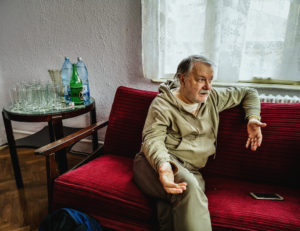
Ironic, easygoing and forthcoming with many stories, Newell is 60 years old now.
When he was a teenager, he realized he was gay and living in a country that severely punished homosexuality. At age 17, he had spent several days in police custody for that offense.
Because they didn’t have anywhere private to meet partners under the Communist regime, homosexuals frequented some public places in the center of the Bucharest, such as an American-style public restroom with long urinals on the walls. A vice squad, designed to arrest homosexuals and prostitutes, knew about these places, and officers often showed up dressed in civilian clothes, trying to entrap gay people.
“I went [into the restroom] fishing. You know what that means, right?” Newell says. “Well, the one I liked turned out to be a police major who caught me and said, ‘You’re done, faggot. I’m throwing you in jail for this.’ ”
Because he was still underage, Newell was not taken to jail, but to a police station where he was kept for three days. Officers beat him, which was standard practice at the time. “They had to beat you [so you would)]write a statement,” he says. “And it was very important to write exactly what they dictated to make it easy for the prosecutor to accuse you under Article 200.”
Newell smiles and says that generally he is not afraid of the consequences of his actions, but he knows his arrest was devastating to others. When his father came to take him home, the older man was as pale as if he had been drained of blood. The first words Newell’s father told him were, “I hope your mother doesn’t hear about this.”
Many LGBTQ people lived a dual life in the Communist era. Often, they would marry so the police wouldn’t suspect them of being homosexual. Newell remembers that marriage between a gay man and a lesbian was common at the time. It was the only way they could protect their intimate lives and be assured of spousal discretion.
Denunciations by family members were encouraged, and it was common for straight women to denounce their husbands for homosexuality. But such betrayals also took place among the members of the gay community. Having to choose between their own freedom and that of the other—and being subjected to torture and beatings in police custody—many gay people bowed to police demands under pressure. The police wanted arrestees to give as many names as possible; if they denounced well-known people who could be blackmailed, that was even better in the eyes of the authorities. Gay people whom police threatened might be let go without arrest if they cooperated or, if a person cooperated after being arrested, he or she might receive only a mild punishment.
“We did not have a gay community like the other countries in the socialist camp,” Newell says. “What Communism did in Romania was the atomization of the gay community. You could not trust anyone.”
In 1980, Newell supported the formation of a free labor union as an alternative to the Communist Party’s labor union. Government authorities stripped him of his Romanian citizenship, and he was left with two options: leave the country or go to prison. He fled to the United States, where he started a correspondence club between Romanian and American LGBT people.
During the three years the club existed, Newell received 680 letters from Romania. “Well, some thought it was some kind of dating club,” he says. “They were sending me pictures of them, their height, weight, age. I even received love poems.”
Newell responded personally to the first letter from every correspondent. The need for communication was so great that Romanian gay people accepted the risk of ending up in jail if their correspondence was intercepted by authorities. Newell says those who wrote the letters were not timid or ashamed. They felt good about themselves, even if the country they were living in was constantly telling them they were wrong. Many in the correspondence club asked for gay porn magazines. They were curious to see them and, for a while, he complied. Later, he realized he could not continue because shipping costs were so high.
Newell decided to return to his home country at another tense moment for Romanian homosexuals. In 2000, discussion was taking place about the abolishing of Article 200 and decriminalizing homosexuality. This initiative didn’t come from the Romanian government, but from external sources.
“I felt it was the time for me to do something for my community,” Newell says. “I had seen in the U.S. how the LGBTQ community was fighting, and I thought to myself, ‘If they can, we must be able to as well.’ So I came back.” The Communist regime had been overthrown, and Newell was allowed to return to the country and regain his Romanian citizenship.
Article 200 and Its Victims
The Communist authorities in Romania had an overriding purpose: to consolidate the totalitarian regime. To achieve this goal, they needed Romanian citizens to reject the West and the democratic parts of Europe. LGBTQ people became emblematic of the “decadent West,” and hunting them became a national duty.
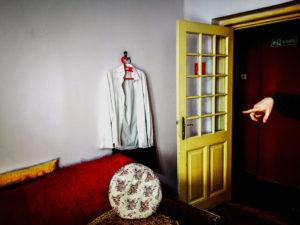
The Romanian Communists wanted a large population, which they tried to achieve by controlling the bodies of their citizens. Abortion was banned, regardless of circumstances. The LGBTQ community, too, was considered a threat to population growth. By sowing terror and systematically encouraging the denunciation of LGBTQ people, the Communist regime sought to ensure its continuity.
After the fall of the Communist regime in 1989, Romania made the transition from a totalitarian state to a democratic one. However, Romanian politicians retained Article 200 that prohibited same-sex relationships, and many in the LGBTQ community continued to face harsh treatment.
Mariana Cetiner is the only woman in Europe known to be condemned and imprisoned for lesbianism in modern times. This happened in 1995, and, in an interview in the Romanian newspaper Adevărul, she remembers how she remained on her knees for hours while tied to pipes in a police station. She went without food and water, and guards beat and humiliated her. Cetiner was sentenced to three years in prison but was released in 1997 following pressure from non-governmental organizations (NGOs) outside the country.
A Human Rights Watch report details cases of other gay people who were imprisoned between the fall of Communism and the abolition of Article 200. Ciprian Cucu and Marian Mutaşcu were sent to prison and tortured following a denunciation by Cucu’s sister. The police and the prosecutor wanted to know which of the two men was the “woman” in the relationship. This translated into “experiments” in which the two men were raped in prison while guards watched, according to Cucu’s testimony. Later, Mutaşcu committed suicide.
Ovidiu Bozdog, director of a local newspaper in Sibiu, was imprisoned under Article 200 after police applied pressure on some of his acquaintances. At the time he was denounced, Bozdog was preparing to launch a newspaper opposing the government.
When a gay person was imprisoned, guards made it a point to let the other inmates know a gay person was going to arrive. According to victims’ statements, the guards encouraged rape and sometimes took part in it.
Heavy external pressure led to the revocation of Article 200 in 2001. While the country still had a law against homosexuality, it couldn’t become a full member of the European Union, and that law also interfered with Romania’s entrance into the Council of Europe.
Newell believes that the abolition of Article 200 partly resulted from the arrival of Michael Guest, the new U.S. ambassador to Romania. Guest was going to be accompanied by his male partner (now his husband) and thus put Romania in an impossible situation—the U.S. ambassador would be illegal in the country if that penal code article were still in place when he arrived.
Although Article 200 was revoked, many Romanians still believed homosexuality was criminal—or at least aberrant.
Doctors said on TV that homosexuality was a disease, and politicians announced there were no homosexuals in Romania. Church and government representatives claimed LGBTQ people were a threat to national security. The Accept Organization—the first Romanian LGBTQ rights group—formed in 1996 with the declared purpose of protecting human rights because the protection of LGBTQ rights was still illegal. Accept members recall appearing on TV shows at that time and enduring the hostility of camera operators.
“I was the devil to them,” says Florin Buhuceanu, current president of Accept. “I felt like an insect nailed down in an insectarium.”
Article 200 made Romania famous in Europe for the institutionalized violence with which LGBTQ people were treated—and for the fact that its abrogation came very late. Romania was one of the last countries in Europe to decriminalize homosexuality.
The Price of Being Gay Today
Eighteen years after homosexuality became legal, gay people in Romania still do not enjoy the same level of legal protection as straight people. The country does not recognize same-sex marriages, and there is no civil partnership law. And although the terrors that Adrian Newell faced in the 1970s are gone, the unsettling months leading up to the 2018 referendum revealed the social problems that continue to confront gay people in Romania.
“This referendum was like poking a beehive with a stick and waiting to see what happens,” says Andreea, a 27-year-old woman working in an advertising agency in Bucharest. “It brought out the worst in people—it was like a slap in the face when you are not looking.” (Andreea asked that her last name not be used.)
When I met Andreea, the first thing I noticed were her tattoos. She was very nervous when we met because she had never talked to a journalist about what it was like to be gay in Romania. She said her first tattoo depicted four swallows and that she had chosen that bird because it always returns home no matter where it flies. For Andreea, the idea of feeling at home is very important. But when she left her hometown and moved to a bigger city, she had her tattoo redone with the image of part of a painting by M.C. Escher. She thought the work of one of her favorite artists would represent her better.
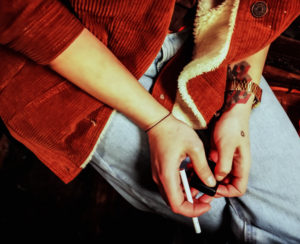
“You know, for me ‘home’ is more about people than the place,” Andreea says. “I had [a] ‘home’ in my town, but I did not necessarily feel at home. It wasn’t bad or anything. It simply wasn’t it.”
Andreea was born and lived for 18 years in a small town on the Danube River. At that time, the gay community was beginning to form in Bucharest, but LGBTQ people were invisible in small towns.
She came from a religious family and was taught to go to church every Sunday. When she was in high school, she realized she was sexually attracted to women.
Andreea had no information about homosexuality, felt she could not ask her parents and did not understand what was going on, but she had the internet. She entered a forum on a dating site and started asking questions. Later, she read more about what it means to be gay. The first person she came out to was her best friend, but the response was not positive.
“She said something like, ‘Of course you are, cause you’re bored with men, aren’t you?’ ” Andreea says. “I was still a virgin. I did not know anything, but I felt the need to tell someone. And that was her reaction.”
At one point, she had what she calls “a summer fling” with a boy in her town. But at that time, she fell in love with a girl, and she told her boyfriend the truth. He did not understand how Andreea could prefer women and accused her of trying to humiliate him.
She had “the conversation” with her mother much later. Her father doesn’t know to this day.
“My mom told me she thinks it’s a psychological issue,” Andreea says. “She thought it was something related to depression, and that it would pass. But it was OK—at least she tried to understand as much as she could. I accept even the slightest effort from anyone, even if they put me in a totally different box. At least they are trying to do something with the information.”
After graduating from high school, Andreea moved to Iaşi to study at the Faculty of Arts. One evening she befriended a random woman on Facebook. The woman lived in Bucharest, and they began to exchange messages over the internet. They met face to face for the first time during a spring holiday in Andreea’s hometown.
“I was head over heels from the moment I saw her,” Andreea says. “I decided to move to Bucharest.” There, the two began a relationship that lasted five years. They lived together and ran into their share of prejudice. For example, when they refused to pay money they didn’t feel they owed a former landlady, the woman threatened to write to each of their parents and reveal the truth about their relationship. Her girlfriend was terrified by this prospect, but Andreea did not want to give in to blackmail.
“[I told the landlady], ‘you know what, I’ll send you a picture of the two of us so you can show it to them if you want,’ ” Andreea says. The woman backed off and never contacted their parents.
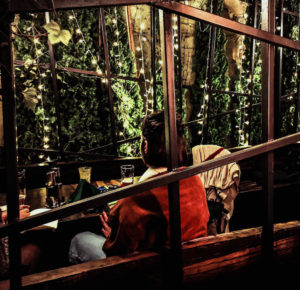
Andreea is determined to leave Romania if civil partnership is not approved by the time she is ready to marry. “If things do not change, I do not want to raise my children here,” she says. “I will go where it is easier for me, my partner and the children I want to have.”
The Winds of Change
Any legislative change regarding LGBTQ rights in Romania must be accompanied by a change in mentality. LGBTQ activist Viski says studies show that personal contact with a person different than yourself decreases your level of intolerance. The problem is that many people in Romania think they have never met a gay person. According to Viski, this stems from the years when the LGBTQ community was forced to become invisible under Article 200.
Newell says Romanian homophobia is not a psychological but a cultural phenomenon.
“The Romanian does not really care what you are doing, but he knows it’s wrong and he repeats it because that’s what the priest told him,” Newell says. “In a way, this is good because things can change through education.”
Social attitudes may change only slowly, but they are changing, according to Adrian Coman, former executive director of the LGBTQ rights group Accept.
“In the 2001 polls, [in response to] the question ‘Whom would you hate having as a neighbor,’ 85% of Romanians said they would not want a gay neighbor,” Coman says. “Now we have reached 30%, so the social perception has evolved.”
Coman also points to legal victories that may be easing the way for same-sex marriages in Romania.
This cautious optimism is spreading six months after the referendum failed and more than a year after alt-right groups tried to stop the projection of a gay movie at the Romanian Peasant Museum. Snow is no longer squeaking under our feet, and apple blossoms fly in the spring breeze. It may be a new dawn.
Your support is crucial...As we navigate an uncertain 2025, with a new administration questioning press freedoms, the risks are clear: our ability to report freely is under threat.
Your tax-deductible donation enables us to dig deeper, delivering fearless investigative reporting and analysis that exposes the reality beneath the headlines — without compromise.
Now is the time to take action. Stand with our courageous journalists. Donate today to protect a free press, uphold democracy and uncover the stories that need to be told.


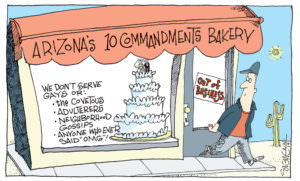
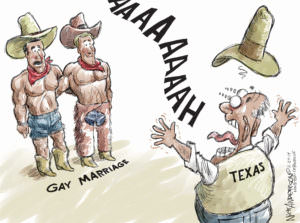
You need to be a supporter to comment.
There are currently no responses to this article.
Be the first to respond.